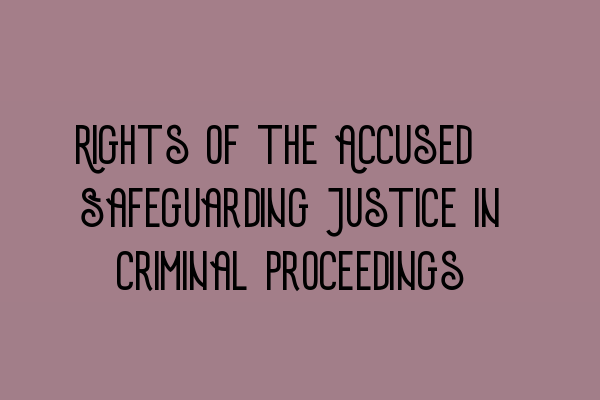Rights of the Accused: Safeguarding Justice in Criminal Proceedings
When it comes to criminal proceedings, safeguarding the rights of the accused is essential in ensuring justice is served. The legal system is designed to uphold the principles of fairness and due process, providing protections to individuals facing criminal charges.
The Presumption of Innocence
One of the foundational principles of criminal law is the presumption of innocence. This means that every accused individual should be considered innocent until proven guilty. It is the burden of the prosecution to prove the guilt beyond a reasonable doubt. The presumption of innocence acts as a safeguard against wrongful convictions and protects the rights of the accused.
However, it is important to note that the presumption of innocence does not mean the accused is immune to legal proceedings. It simply means that the accused should not be treated as guilty until proven so in a court of law.
The Right to Legal Representation
Another crucial right of the accused is the right to legal representation. This ensures that individuals facing criminal charges have access to legal advice and assistance throughout the entire legal process. It helps to level the playing field by providing professional expertise to aid in building a defense and navigating complex legal procedures.
SQE 1 Preparation Courses offer comprehensive guidance on the legal aspects of criminal proceedings, helping aspiring solicitors develop the necessary skills and knowledge to provide effective representation to their clients.
The Right to a Fair Trial
A fair trial is the cornerstone of justice. It guarantees that the accused receives a hearing in front of an impartial judge or jury. This right includes the opportunity to present evidence, cross-examine witnesses, and challenge the prosecution’s case.
The SQE 2 Preparation Courses focus on preparing solicitors for the practical aspects of criminal law, including trial advocacy skills. These courses provide valuable insights into how to effectively advocate for the rights of the accused in a courtroom setting.
Protection Against Self-Incrimination
The right to protection against self-incrimination is an essential safeguard in criminal proceedings. This means that an accused person cannot be compelled to testify against themselves. It is up to the prosecution to gather evidence independently and prove the guilt of the accused without relying on their own statements.
The Right to a Speedy Trial
The right to a speedy trial ensures that the accused is not subjected to undue delays in their criminal proceedings. This right protects against the potential harm caused by prolonged pretrial detention and ensures the timely administration of justice.
The SRA SQE Exam Dates article provides important information on the upcoming exam dates, enabling solicitors to plan and manage their caseloads efficiently.
Conclusion
The protection of the rights of the accused is fundamental to safeguarding justice in criminal proceedings. By upholding the principles of fairness, due process, and the presumption of innocence, the legal system ensures that individuals facing criminal charges are treated fairly and have the opportunity to present a defense. Aspiring solicitors can benefit from SQE 1 Practice Exam Questions and SQE 1 Practice Mocks FLK1 FLK2 to further enhance their understanding and application of criminal law.
